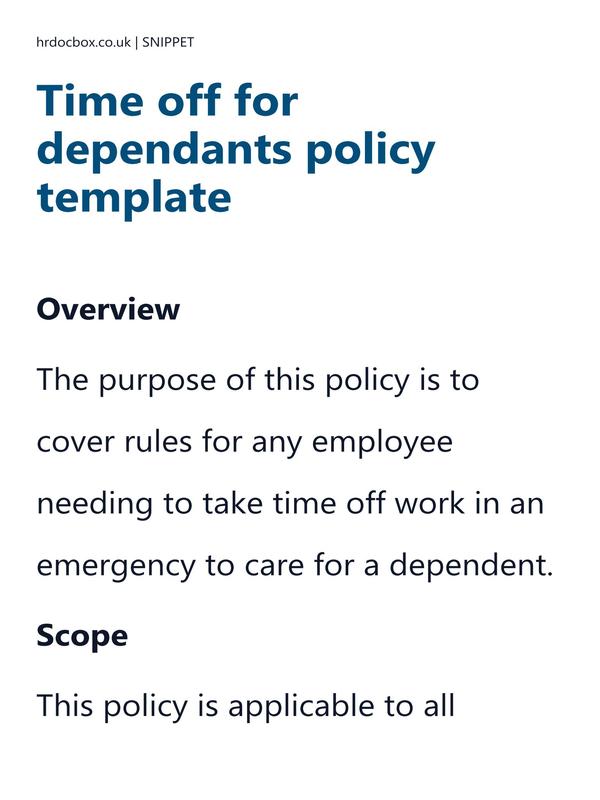Time off for dependants policy template


Our Time Off for Dependants Policy Template aids employees during family emergencies, ensuring compassionate support without work worries.
- Includes 12 months' access to the Time off for dependants policy template, with all updates provided free of charge and notified to you.
- UK-specific accuracy.
- 153 words over 1 page.
- Last updated 20/02/2026.
- Format: Word / plain text / email.
- Delivery: Instant download after purchase (no physical item).
- Access: Download link shown here after checkout.
- This Time off for dependants policy template will SAVE you up to 30 mins drafting & research, save you money, and reduce your risk.
Time off for dependants policy
1 Overview
1.1 The purpose of this policy is to cover rules for any employee needing to take time off work in an emergency to care for a dependent.
2 Scope
2.1 This policy is applicable to all employees of [company name].
3 General principles
You are legally entitled to take a reasonable amount
This is a 30% preview of the Time off for dependants policy template. For instant full access, purchase this item or a parent bundle.
Time off for dependants policy template purpose
A time off for dependants policy is a set of guidelines and procedures that an organisation establishes to allow its employees to take time off work to care for dependants who are experiencing an unexpected emergency or situation. Dependents may include children, elderly parents, or other family members who require care and support.
Under a time off for dependants policy, employees are typically allowed to take a reasonable amount of time off work to deal with emergency situations such as the illness, injury or death of a dependent, or a situation where their normal care arrangements have unexpectedly broken down. The length of time off and whether it is paid or unpaid may depend on the specific policy of the organisation, local regulations, and the individual circumstances.
The policy may specify how much notice an employee is required to give before taking the time off, and what documentation is required to support the need for the leave.
A time off for dependants policy can be beneficial for employees, as it allows them to balance work and family responsibilities during times of crisis or unexpected events. Additionally, it can be beneficial for employers, as it can help to maintain employee morale and productivity, and reduce the risk of employee burnout and turnover.
Practical application of a Time off for dependants policy template
- Issue the Time off for dependants policy template during onboarding / after changes / planned refresher.
- Send it to appropriate internal recipients such as employees, workers, contractors etc. and request confirmation that is has been read and understood.
Compliance
Compliance
This Time off for dependants policy template incorporates relevant UK laws and HR standards, including those listed below:
A dependant could be a spouse, partner, child, grandchild, parent, or someone who depends on someone for care.
-
Employment Rights Act 1996: Provides the right for eligible employees to take time off to handle unexpected situations involving dependants.
-
Working Time Regulations 1998: Ensures that employees have adequate rest and breaks, supporting their ability to handle dependant-related emergencies.
-
Equality Act 2010: Prohibits discrimination against employees when requesting time off for dependants, ensuring fair treatment.
-
Parental Leave Regulations 2013: Offers eligible employees the right to take unpaid parental leave, which may be used in certain dependant situations.
-
Family-friendly Policies: While not a specific legislation, promoting family-friendly policies aligns with the spirit of supporting time off for dependants.
Frequently Asked Questions about a Time off for dependants policy template
Frequently Asked Questions about a Time off for dependants policy template
-
Can I use the Time off for dependants policy template in my small business?
Yes. The Time off for dependants policy template is designed to be flexible and suitable for organisations of all sizes, including small businesses and charities. It follows UK employment law best practice, so even if you don't have an in-house HR team, you can confidently apply it.
-
Is the Time off for dependants policy template compliant with 2026 UK employment law?
Absolutely. Like the Time off for dependants policy template, all of our templates are drafted with the latest ACAS guidance and UK employment legislation in mind. We review and update them regularly, so you can be confident they remain compliant.
-
Can I customise the Time off for dependants policy template for my organisation?
Yes, we highlight the areas of the Time off for dependants policy template that you need to update with your own details, and where you need to make decisions to suit your situation. This saves you time and ensures that you meet best practice.
-
Do I get instant access to the Time off for dependants policy template?
Yes. Once purchased, you'll be able to download the Time off for dependants policy template instantly. Templates are provided in editable Word or Excel format so you can customise them easily, and in PDF format for easy sharing.
-
What if I need more help, not just a Time off for dependants policy template?
If you're looking for broader support, we also offer toolkits and library bundles that include the Time off for dependants policy template, along with other HR templates and policies for fully managing your situation. These may be more cost-effective if you need deeper advice.
-
Why should I use this Time off for dependants policy template, and not AI to generate it?
The risk of using a free AI-generated template 'without review' includes your legal exposure, missing context, and no awareness of the wider process, whereas purchasing the Time off for dependants policy template from us mitigates that risk.
